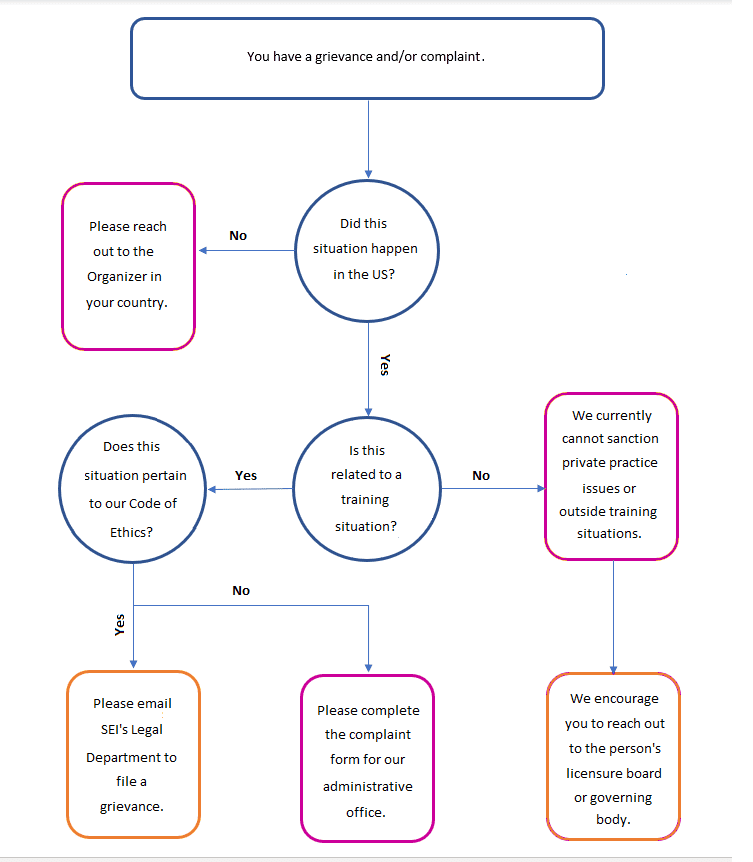ETHICS
In 2021, SEI finalized and implemented its first US Code of Ethics, Standards of Practice and Grievance Procedure. The work was led by a community-driven Ethics Work Group, and SEI leadership and staff continued to lay the groundwork to appropriately handle ethics inquiries and grievances. Currently, our Ethics & Grievance Committee has three focal points for our monthly meetings:
- We employ outside legal counsel to keep our documents current and accurate and provide overall guidance to the Committee
- We review grievances as they are submitted
- We provide education and support to the SE community around ethics-related topics
This webpage aligns with our third focal point, “providing education and support around ethics.” Keep an eye on this page for upcoming webinar recordings, FAQs, and additional support around ethics-related concerns and/or questions.
READ SEI'S POLICIES
View our Policies page to read our Code of Ethics, Grievance Procedure, and more.

NOT SURE WHERE TO START?

WHAT'S THE DIFFERENCE BETWEEN A GRIEVANCE AND A COMPLAINT WITH SEI?
PAST ETHICS WEBINARS
SEI Ethics – Creating an Ethical Practice
with Bhanu Joy Harrison, LCSW, SEP
Creating a ‘safe' experience for our students and clients is much greater than the specific modality that we use. Ethical practice is the foundation and structure for all our interactions with clients and the public.
In this two-hour ethics presentation, we will explore all the components necessary to create an ethical practice. Topics will include written, spoken and digital language, paperwork, financial discussions and consent forms, establishing appropriate boundaries, how touch is used in trainings and sessions, processes to repair mistakes and personal sustainability.
SEI Ethics – Scope of Practice Issues
with Bhanu Joy Harrison, LCSW, SEP
Being ethical in our SE practice includes being clear on our Scope of Practice. Scope of Practice is defined as what you can and cannot do under the licensure or certification that you hold.
In this webinar, we will review Scope of Practice parameters for various professions and delve into the often gray area of somatics, counseling and trauma work. Having clarity of our own Scope of Practice enables each of us to practice with good boundaries and integrity, ensuring safety for our clients.
Learning objectives include:
1. Define “Scope of Practice” for your particular profession.
2. Describe how does your particular Scope of Practice affects your use and practice of SE interventions.
3. Clarify when you are practicing “out of your Scope of Practice”.
4. Understand the ethical principles behind Scope of Practice issues and learn how to implement them.
5. List the negative impacts of practicing out of your Scope of Practice and how this can cause harm to your clients.
SEI Ethics – Multiple Roles and Confidentiality
with Bhanu Joy Harrison, LCSW, SEP
In this webinar, we will be discussing the ethical considerations of multiple roles and confidentiality which appear in the SEI's Code of Ethics and Standards of Practice. Working with individuals with trauma histories can complicate these relationships and communications. SE practitioners across the U.S. represent many licensed and unlicensed professions. This webinar will clarify these fine points of ethical conduct.
Learning objectives include:
1. Define multiple roles and be able to list a variety of types of multiple roles.
2. Describe the limits of confidentiality in SE sessions.
3. Understand the Standards of Practice from the SEI Code of Ethics in relationship to multiple roles and confidentiality and describe the potential negative consequences for clients when multiple roles and confidentiality issues are mishandled.
4. Discern the applicability of these ethical practices in relationship to your particular profession.
5. Describe the ethical challenges of social media and the intersection of multiple roles and confidentiality.
SEI Code of Ethics
Bhanu Harrison, LCSW, SEP, joins Kathy Hally, Legal Affairs & Ethics Manager from SEI's Legal Department to discuss and explain the Code of Ethics and Grievance Procedure documents. Special note: When “faculty” is mentioned during the recording, it pertains to all whom the Code of Ethics applies, and not just faculty members. The extensive list is included in our Code of Ethics document on page 3.
ETHICS FAQ
See below for frequently asked questions and if you need further assistance, please email: legal@traumahealing.org
What type of grievances can be filed?
Legal grievances related to our Code of Ethics may be reported to the Ethics Committee for review. While Somatic Experiencing® is not a licensure program, we recognize the need to address grievances in the context of our U.S.-based trainings.
What is the deadline for filing a grievance?
All grievances should be filed in a timely manner. Grievances of a general nature must be filed within one (1) year of the alleged occurrence. Grievances of a sexual nature must be filed within seven (7) years of occurrence.
Is my information kept confidential?
Grievances will be kept confidential to the extent possible, consistent with the need to conduct an adequate investigation and in accordance with our Grievance Procedure. The complainant will be informed with whom the information is shared.
Who has access to my complaint and information surrounding the filing?
As a general rule, the grievance will be seen by the SEI Legal Department-which includes the Director of Legal Affairs and the Legal Affairs & Ethics Manager. If the grievance goes to the Committee, the Ethics Committee members will also see the file and all related documents. Your grievance will only be shared as necessary, in accordance with our Grievance Procedure.
Who will review my grievance?
The Ethics Committee will review your grievance. The SEI Legal Department will keep you updated as your filing moves through the Grievance Process. Please email Legal@traumahealing.org if you have any questions for the Committee or Legal Affairs & Ethics Manager.
How long will it take for my grievance to be reviewed?
Currently, the Ethics & Grievance Committee meet once a month, and they do not discuss grievances outside of that time. They are also establishing more processes and procedures, after which time the Committee will meet quarterly. You can expect the grievance to be reviewed within three to four months. You will be kept informed by the Legal Affairs & Ethics Manager.
Can I file a grievance anonymously?
Anonymous grievances will not be heard or processed through the Grievance Procedure. However, should the Ethics Committee receive a written, anonymous grievance, a record will be kept by SEI’s office for a period of three (3) years.
I am afraid of retaliation. Where does SEI stand with this?
SEI does not tolerate retaliation. No individual who in good faith reports a violation of a law or regulation requirement shall suffer harassment, retaliation, or adverse employment consequence. An employee who retaliates against someone who has reported a violation in good faith is subject to discipline up to and including termination of employment. SEI’s Whistleblower Policy is intended to encourage and enable persons to raise serious concerns within SEI prior to seeking resolution outside of SEI.

